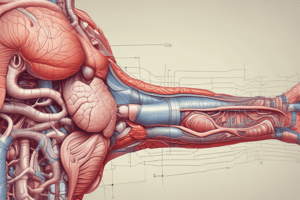Podcast
Questions and Answers
What is the primary function of the small intestine within the digestive system?
What is the primary function of the small intestine within the digestive system?
- Nutrient absorption (correct)
- Elimination of waste
- Storage of food
- Mechanical digestion of food
Which process involves the breakdown of food molecules through physical means such as chewing?
Which process involves the breakdown of food molecules through physical means such as chewing?
- Absorption
- Chemical digestion
- Elimination
- Mechanical digestion (correct)
What role does bile play in the digestive system?
What role does bile play in the digestive system?
- Breaks down proteins
- Stores undigested food
- Helps to absorb water
- Aids in fat digestion (correct)
Which organ is responsible for the initial digestion of food through chewing and salivary enzymes?
Which organ is responsible for the initial digestion of food through chewing and salivary enzymes?
Where does the process of absorption of nutrients primarily occur?
Where does the process of absorption of nutrients primarily occur?
What is the purpose of the rectum in the digestive system?
What is the purpose of the rectum in the digestive system?
Which digestive disorder is characterized by inflammation of the stomach lining?
Which digestive disorder is characterized by inflammation of the stomach lining?
What is peristalsis in the context of the digestive system?
What is peristalsis in the context of the digestive system?
Flashcards
Digestion
Digestion
The process of breaking down large food molecules into smaller, absorbable units.
Mechanical Digestion
Mechanical Digestion
Involves physical breakdown of food through chewing and churning.
Chemical Digestion
Chemical Digestion
Involves enzymes breaking down food into simpler compounds.
Ingestion
Ingestion
Signup and view all the flashcards
Absorption
Absorption
Signup and view all the flashcards
Elimination
Elimination
Signup and view all the flashcards
Peristalsis
Peristalsis
Signup and view all the flashcards
Segmentation
Segmentation
Signup and view all the flashcards
Study Notes
Overview
- The digestive system is a complex network of organs working together to break down food into absorbable nutrients.
- It's a long, muscular tube that runs from the mouth to the anus.
- Its primary functions are ingestion, digestion, absorption, and elimination.
Ingestion
- The process of taking food into the body.
- Begins in the mouth with chewing and swallowing.
- Mechanical breakdown of food occurs through chewing.
- Salivary enzymes begin chemical digestion.
Digestion
- The process of breaking down large food molecules into smaller, absorbable units.
- Mechanical digestion involves physical breakdown (e.g., chewing, churning).
- Chemical digestion involves enzymes breaking down food into simpler compounds (carbohydrates, proteins, fats).
Absorption
- The process of absorbing the digested nutrients into the bloodstream.
- Takes place primarily in the small intestine.
- Villi and microvilli increase the surface area for absorption.
- Nutrients are transported to various parts of the body for use.
Elimination
- The process of removing undigested food and waste products from the body.
- Occurs in the large intestine.
- Water is reabsorbed.
- Solid waste (feces) is compacted and eliminated through the anus.
Organs of the Digestive System
- Mouth: Ingestion and initial digestion.
- Esophagus: Transports food from the mouth to the stomach.
- Stomach: Stores food, mixes with gastric juices, and continues mechanical and chemical digestion.
- Small intestine: Major site for nutrient absorption.
- Large intestine (colon): Absorbs water and electrolytes, forms feces.
- Rectum: Stores feces.
- Anus: Eliminates feces.
Accessory Organs
- Liver: Produces bile, crucial for fat digestion.
- Gallbladder: Stores and concentrates bile.
- Pancreas: Produces digestive enzymes for the small intestine.
Key Processes
- Peristalsis: Rhythmic muscle contractions that move food through the digestive tract.
- Segmentation: Mixing contractions in the small intestine that further breaks down food.
- Chemical digestion depends on specific enzymes tailored to each type of nutrient.
- Enzymes and other secretions produced by different glands and organs are critical to the digestion process.
Digestive Disorders
- Heartburn: Acid reflux from the stomach.
- Gastritis: Inflammation of the stomach lining.
- Ulcers: Sores in the lining of the stomach or duodenum.
- Irritable bowel syndrome (IBS): A common disorder affecting the large intestine.
- Inflammatory bowel disease (IBD): Chronic inflammation of the digestive tract.
- Celiac disease: Immune response to gluten.
Healthy Digestive Habits
- Eating a balanced diet.
- Maintaining a healthy weight.
- Exercising regularly.
- Avoiding excessive stress.
- Getting enough sleep.
Studying That Suits You
Use AI to generate personalized quizzes and flashcards to suit your learning preferences.




